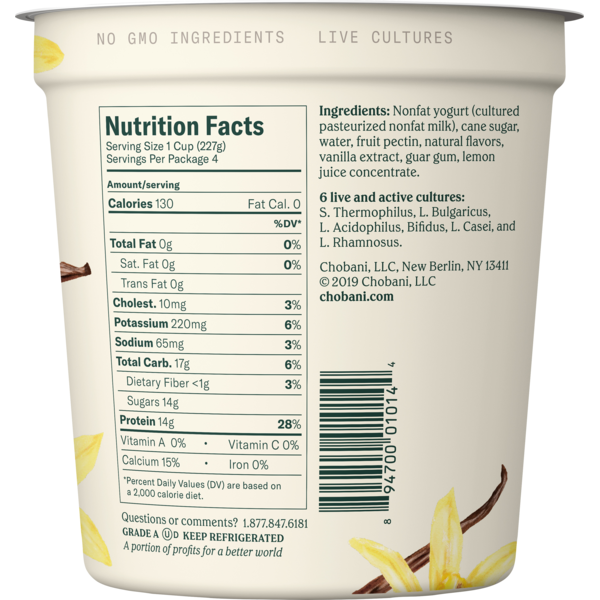In a recent development that has captured national attention, Chobani, the popular Greek yogurt brand, is facing a class action lawsuit over allegations that its products contain toxic chemicals known as phthalates. This case, which highlights growing concerns about food safety and corporate transparency, has sparked discussions among consumers, regulators, and legal experts across the United States.
The Allegations: Toxic Chemicals in “Natural” Yogurt
The lawsuit, filed by plaintiff Amy Wysocki in April 2025, claims that Chobani’s Greek yogurt contains phthalates—endocrine-disrupting chemicals that leach from plastic packaging. These chemicals are not added intentionally but are believed to migrate into the product during manufacturing or storage. According to independent testing, Chobani’s Nonfat Plain and Whole Milk Plain Greek Yogurt contain di-2-ethylhexyl phthalate (DEHP), diethyl phthalate (DEP), dibutyl phthalate (DBP), and di-2-ethylhexyl terephthalate (DEHT), all of which have been linked to potential health risks such as reproductive and developmental issues.
Wysocki, a California resident, alleges that she purchased the yogurt believing it was free of artificial chemicals, relying on Chobani’s “Only Natural Ingredients” label. The lawsuit argues that this label is misleading and violates California’s consumer protection laws.
The Science Behind Phthalates
Phthalates are synthetic compounds commonly used as plasticizers to make materials like polyvinyl chloride more flexible. While they are not typically added to food, they can leach from packaging into the product, especially when exposed to heat or certain types of fats.
These chemicals are classified as endocrine disruptors, meaning they interfere with the body’s hormone systems. Studies suggest that even low doses of phthalates can cause harm, particularly in vulnerable populations such as children and pregnant women. Health risks associated with phthalate exposure include:
- Reduced sperm quality
- Earlier menopause
- Low birth weight
- Pregnancy loss
- Preterm birth
- Neurological issues in children
- Increased risk of cancer and other chronic diseases
While Chobani maintains that its products meet all safety standards, critics argue that current regulations do not fully account for the long-term effects of low-dose chemical exposure.
Legal Claims and Consumer Protection
The lawsuit accuses Chobani of false advertising under California’s Consumers Legal Remedies Act and Unfair Competition Law. It also cites the False Advertising Law, alleging that the company misrepresented the nature of its products. Plaintiffs argue that the “natural” label on Chobani’s packaging is deceptive, as it does not disclose the presence of toxic chemicals that may have migrated from the plastic containers.
Additionally, the suit claims that Chobani violated its express warranty by failing to deliver products that met the expectations set by its marketing. It seeks damages for overpayment, legal fees, and a jury trial.
Chobani’s Response: Compliance and Denial

Chobani has denied the allegations, stating that its products comply with all federal and state safety regulations. The company emphasizes that it conducts rigorous quality control measures and third-party testing to ensure the safety of its products. Chobani also points out that the phthalates found in the yogurt are present in trace amounts and are not intentionally added to the product.
However, some experts argue that even small amounts of phthalates can be harmful, especially when consumed regularly. They call for stricter regulations on chemical migration from food packaging and clearer definitions of what constitutes “natural” ingredients.
The Status of the Case
As of October 2025, the court has denied Chobani’s motion to dismiss the lawsuit, allowing the case to proceed. This decision supports the plaintiffs’ argument that consumers who paid a premium for “natural” yogurt were economically harmed by the alleged misrepresentation.
No trial date has been set, but the case could lead to settlements, changes in packaging, or broader scrutiny of plastics in food. Other lawsuits against Chobani over labeling have also emerged, suggesting that the company may face increasing legal challenges in the future.
Broader Implications: Food Safety and Consumer Trust
This case raises important questions about food safety and the reliability of product labels. As consumers become more aware of the potential risks associated with plastic packaging, there is growing demand for transparency and accountability from food manufacturers.
Many shoppers now look beyond marketing claims and seek out products that use glass jars or phthalate-free packaging. Others advocate for stronger regulations to prevent chemical migration and ensure that “natural” labels accurately reflect the contents of the product.
Advice for Consumers

For those concerned about phthalate exposure, several steps can be taken to reduce risk:
- Choose products packaged in glass or metal rather than plastic.
- Look for brands that use phthalate-free packaging or have certifications for safe materials.
- Opt for fresh, unpackaged dairy products when possible.
- Stay informed about ongoing lawsuits and regulatory updates.
Consumers can also support efforts to strengthen food safety standards and hold companies accountable for their labeling practices.
How to Join the Class Action
Consumers who purchased specific Chobani yogurt products can join the lawsuit by visiting websites like ClassAction.org or TopClassActions.com and filling out an eligibility form. These platforms make it easy for individuals to participate in legal actions without needing extensive legal knowledge.
However, it is important to note that Chobani’s website terms include a binding arbitration clause that may limit participation in class actions. Legal teams are currently working to determine whether this clause applies to offline purchases and whether it can be challenged in court.
The Future of Chobani and Consumer Advocacy

As the legal battle unfolds, Chobani faces pressure to address concerns about its product safety and labeling practices. The company has a history of promoting sustainability and ethical business practices, but this case has raised questions about its commitment to transparency.
Consumer advocates are urging Chobani to take proactive steps, such as updating its labeling procedures, conducting third-party testing, and engaging with scientists and health experts to ensure the safety of its products.
Ultimately, this lawsuit reflects a broader trend in consumer behavior, where people are increasingly demanding accountability from corporations and seeking out brands that align with their values.
Conclusion: A Call for Transparency and Accountability
The class action lawsuit against Chobani is more than just a legal dispute—it’s a reflection of growing public concern about food safety, corporate responsibility, and the reliability of product labels. As consumers become more informed and vocal, they are pushing for greater transparency and accountability from the companies they trust.
Whether through legal action, advocacy, or personal choices, consumers have the power to shape the future of the food industry. By staying informed and taking action, they can help create a system that prioritizes health, safety, and honesty.
Stay updated with the latest news on Chobani and other trending topics in the United States.












More Stories
US Trending News: The ‘Your Mom’ White House: A Trendy Take on Political Humor
US Trending News: Who Is Karoline Leavitt, ‘Your Mom’ in Political Memes?
How Will VA Compensation Be Affected by a Government Shutdown?